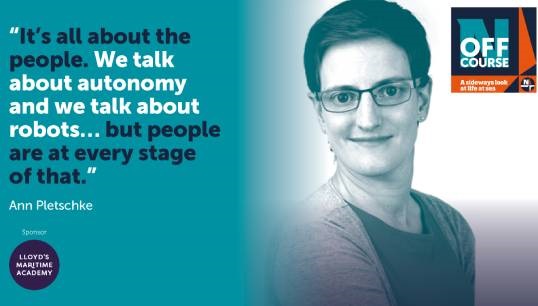Nautilus podcast Off course: humans in the autonomous 'loop' featuring Captain Ann Pletschke
8 November 2023

In Episode 2 of the second series from Nautilus International's podcast Off course: a sideways look at life at sea, we have an uplifting talk with fifth generation master mariner and Merchant Navy medal recipient Ann Pletschke, about what a Just Transition for seafarers might look like as autonomous shipping shapes up.
As someone at the coalface of autonomous shipping Captain Pletschke is upbeat about the future of AI in maritime careers, and the sorts of roles that will be available in future shipboard and for other autonomous technologies – as long as robust regulations are in place – because she says, humans will always be in the 'autonomous loop'.
Captain Pletschke is positive that there will be the need for different skills and different jobs, but that there will still be lots of opportunity out there and possibly like the airline industry, maybe even more jobs available for maritime professionals in the future.
When Capt Pletschke joined the 'autonomous shipping industry' she says she was also a sceptic, concerned like many mariners about maritime safety and the human element, but she came to it with the understanding of dynamic positioning − which she likens to an early forerunner of autonomous ships.
'So dynamic positioning in very basic terms, is the computer driving the ship...That computing power has existed for a long period of time connected with sensors, and that essentially, is what autonomous ships are. It's sensors from the ship controlling the ship.'
Capt Pletschke said that obviously 'robust regulations' need to be in place to make sure that automated shipping is done properly. 'Just like we've seen with dynamic positioning, regulations evolve with technology, so that it can be as safe as it can be. There are definite cases where autonomy can lend itself very, very well in a maritime application.
'At the same time, I do not see cruise ships going autonomous anytime soon. For example, who would the passengers have dinner with? You want to have dinner with the captain on the captain's table. You don't want it to be on the robot's table necessarily, although maybe some passengers would...'
Capt Pletschke acknowledged a key difference: 'When you have no seafarers on board that is being controlled from ashore in certain circumstances, but although controlled remotely, it is still by seafarers ashore. We still need seafarers. It's still in a lot of cases, humans in the loop.'
Similar technology exists in aviation and could be seen in drone technology and similar skills and jobs trends and lessons can be learnt from other transportation industries, and there will be opportunities to improve diversity of minority groups and genders, and even encourage retired people able to keep their hand in through future autonomous skills and other ways in which it will become more accessible as a career, she says.
What will change are the types of jobs, she says. 'For example, ashore, there will be a need for highly skilled jobs, such as with aviation pilots becoming drone pilots, or we see drone pilots that can't necessarily be an aviation pilot for medical reasons that might be able to become a drone pilot or for family reasons.'
Tags
